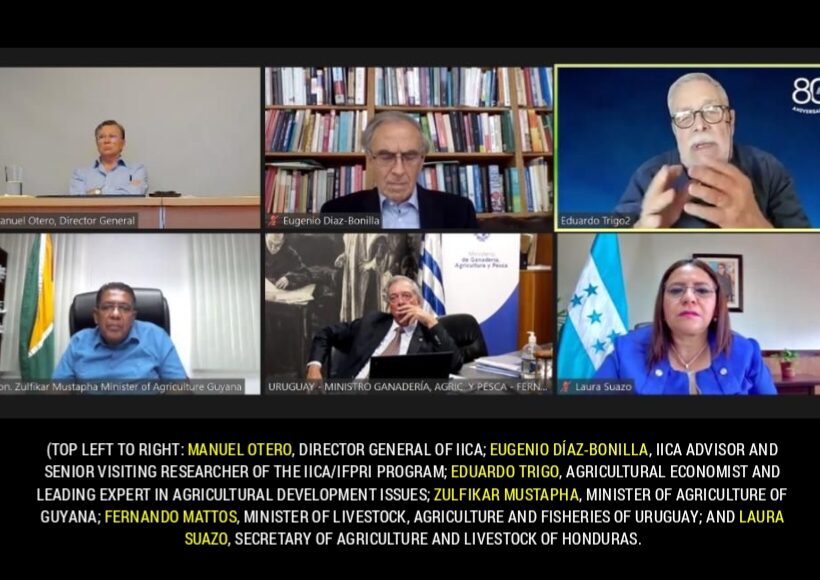Minister of Agriculture, Zulfikar Mustapha, recently welcomed the unveiling of a document titled, “On ‘broken’ food systems and other narratives” by the Inter-American Institute for Cooperation on Agriculture (IICA).
Earlier this week, Minister Mustapha joined his counterparts Laura Suazo, of Honduras and Fernando Mattos, of Uruguay for the presentation of the document.
In his address, the Guyanese minister said that the document “allows us to highlight aspects that will contribute to us having the best strategies and designs to improve food systems.” He said it is a timely report as it comes at a time when the region is seeking, together with its partners to drastically reduce food imports by boosting production.
“We live in very extreme times. Our region is one of the most vulnerable to disasters, to climate events, and within this framework we must offer safe products and compensate farmers for mitigating these problems.
“The document contributes to thinking about the agriculture of the future, about trends; we cannot keep doing the same thing, otherwise we will have more food insecurity. Guyana commends IICA for putting into perspective the agriculture of the Americas, by facing problems such as consumer demands, production strategies, nutrition and food security,” he indicated.
The study is co-authored by researchers Eduardo Trigo, Eugenio Díaz-Bonilla and Rosario Campos.
It describes the most notable moments in the history of global food systems, emphasising their phenomenal expansion in recent decades, when the world’s population increased from about 3 billion in 1960 to nearly 8 billion people today. In that period, it was stated that production increased by an even greater proportion, since there are currently 30% more calories available and almost 35% more protein per capita.
According to the study, this expansion was achieved with an increase in global agricultural land use of less than 9% between 1960 and 2021, and food prices that, in real terms, are 14% below the levels of the 1960s and 1970s. Despite this, the levels of hunger, still persistently high, the difficulties in accessing healthy diets, the increase in obesity, the high level of greenhouse gas (GHG) emissions and the harsh living conditions of a large part of the population that exist in different stages of production and industrialization have given rise to a narrative that claims that “food systems are broken.”
It was stated during the presentation that any assessment of the functioning of food systems must be approached in a well-balanced way. Added to this, it was noted that these analyses must consider not only their weaknesses but also their strengths, in order to obtain adequate diagnoses to design policies that correct negative aspects, enhance existing benefits and involve the greatest number of stakeholders in a positive transformation that contributes to the fulfillment of the Sustainable Development Goals (SDGs) and the Paris Agreement.
“The document aims to delve deeper into the reality of food systems to better understand the logic of their operation. Much progress has been made since the 1960s when widespread famines were predicted until the present day where, despite the fact that the population in the world and in the Americas multiplied by more than 2.5-2.6 times, the supply of calories and proteins per capita at the world level is currently between 30-34% higher than six decades ago, and even more so in the Americas,” said the Director General of IICA, Manuel Otero.
“For these and other reasons, we do not believe that food systems are broken, or failed, or subtract value because they have more costs than benefits, as some narratives argue, although improvements are obviously necessary in various dimensions,” he stated.
Additionally, the document highlights Latin America and the Caribbean’s vital role in global food security and environmental conservation. It highlights the region’s significant growth in agricultural production and its leadership in sustainable farming practices. To add to this, the authors stressed the need for a balanced approach that addresses weaknesses while amplifying strengths to achieve SDGs and Paris Agreement objectives.











